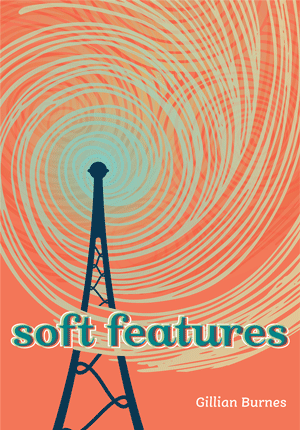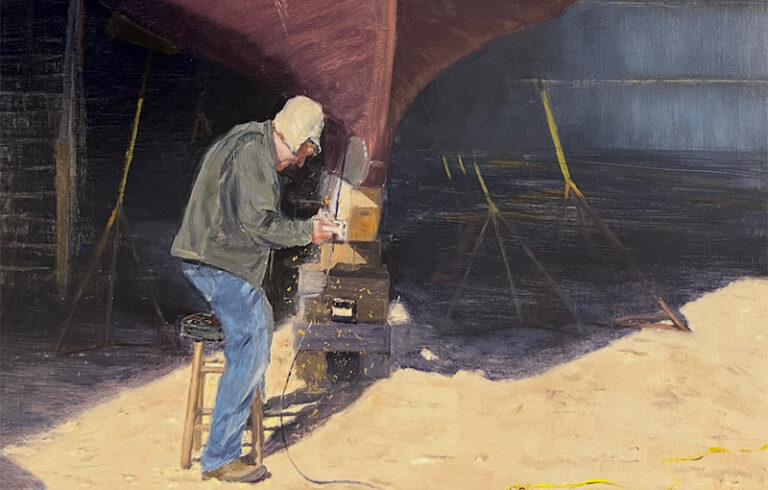Soft Features
By Gillian Burnes; Littoral Books (2022)
Review by Dana Wilde
Where Gillian Burnes got the name “Coralie Threlfell” for the narrator of her novel, Soft Features, I don’t know. But it rings exactly true for a public radio reporter.
Coralie works for the local NPR affiliate based in fictional Winston, Maine, in the mid-1990s. She lives on a farm with her two young daughters and her husband, Lonny. Burly, lionhearted Lonny runs the farm, works the local barter-and-trade network, and writes bad young-adult science fiction stories in his spare time.
Coralie’s newsroom is exactly like newsrooms I’ve known, except they’re making stories for radio, not print. Her colleagues are fairly typical reporters and editors, dedicated to their craft and, not surprisingly, lacking in everyday life the snottiness that often characterizes the on-air voices of public radio personalities. Coralie herself is recognizable to any newsroom journalist. She’s the experienced, highly skilled reporter who never stops making phone calls and follow-ups; who’s in a perpetual state of fret over whether she’s covered all the bases; who’s constantly chasing weird leads that sometimes go down rabbit holes but sometimes turn into home runs; and who quietly, sardonically sees through the bean counters who think they know more about news than newspeople.
One of her stories—a “soft feature”— is about a medical boat that serves the more remote islands…
The story takes us inside Coralie’s farm and on her reporting trips. One of her stories—a “soft feature”— is about a medical boat that serves the more remote islands on the coast. She ends up making several outings, and when her reporting leads her into the middle of a feud between families that results in sunken boats, Coralie has to decide what her journalistic integrity allows her to report or requires her to withhold. The whole episode provides a startlingly authentic look at islanders’ lives and an outside journalist’s inner struggles.
Coralie ushers us around her hectic day-to-day with clever, highly literate, tongue-in-cheek good humor, and pretty much every page of the book is buoyed by her more or less lighthearted banter with herself, her family and her colleagues. But something is not quite right, and she knows it.
 At one point she leaves an animal rescue clinic emotionally shattered by the suffering of the animals, not to mention a jaded veterinarian. Later in the story when she can’t bring herself to make phone calls to families grieving the deaths of children—probably the most depressing task in any newsroom—we understand that Coralie is stricken with journalism’s version of compassion fatigue. In one of many fascinating asides, she argues with herself about the meaning of the word “tragic.” It’s complicated. Relentless bad news grinds down many reporters and editors similar to the ways teaching grinds down many teachers—both professions are moral callings, and both grapple endlessly with seriously affecting human problems. Coralie, in “Soft Features,” reports her own extreme case of it.
At one point she leaves an animal rescue clinic emotionally shattered by the suffering of the animals, not to mention a jaded veterinarian. Later in the story when she can’t bring herself to make phone calls to families grieving the deaths of children—probably the most depressing task in any newsroom—we understand that Coralie is stricken with journalism’s version of compassion fatigue. In one of many fascinating asides, she argues with herself about the meaning of the word “tragic.” It’s complicated. Relentless bad news grinds down many reporters and editors similar to the ways teaching grinds down many teachers—both professions are moral callings, and both grapple endlessly with seriously affecting human problems. Coralie, in “Soft Features,” reports her own extreme case of it.
Things fall apart when, following a hysterical meltdown at an Augusta news conference, Coralie sets off without authorization to investigate weird rumors she’s been hearing about a house-burgling ghost, the “Ptarmigan Pond Goblin.” (The goblin, we gather from Burnes’s acknowledgments note, is modeled on the North Pond Hermit, a national news story broken by Kennebec Journal reporters.)
The whole story and all the characters in Soft Features ring exactly true. It tells a wholly accurate story about the complications and obstacles most journalists face as they struggle to live up to their own and their professional ethics. And it provides an authentic evocation of the good humor most reporters are blessed—or cursed—with, even at the worst of times. People who are cynical about journalists whose lives and work they know nothing about, should read this book.
Dana Wilde is a member of the National Book Critics Circle. He lives in Troy.





